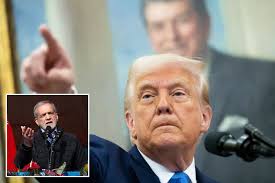Iranian President Masoud Pezeshkian has dismissed the possibility of direct negotiations with US President Donald Trump’s administration regarding Tehran’s nuclear program. However, he indicated openness to indirect discussions while emphasizing that Washington must first address its past “misconduct” and restore trust.
“We responded to the US president’s letter via Oman and rejected the option of direct talks, but we are open to indirect negotiations,” Pezeshkian stated during a cabinet meeting in Tehran on Sunday.
His remarks, reported by ISNA news agency, come amid intensifying tensions between the two nations.
Trump’s Warning: “If They Don’t Make a Deal, There Will Be Bombing”
In a phone interview with NBC, Trump issued a stark warning to Tehran, saying:
“If they don’t make a deal, there will be bombing.”
He further suggested imposing secondary tariffs on Iran, similar to the economic pressure tactics used during his previous term.
Barbara Slavin, a fellow at the Stimson Center in Washington and an international affairs lecturer at George Washington University, highlighted Iran’s distrust towards Trump, recalling his withdrawal from the 2015 nuclear deal.
Recommended Stories:
– Trump orders airstrikes on Iran-backed Houthi rebels in Yemen
– Trump’s 25% Car Tariff Sparks Outrage – Germany Stands Its Ground
“The Iranians are right to be distrustful, given Trump’s track record and withdrawing from a previous deal,” she told Al Jazeera.
Slavin added that while Tehran fears economic instability caused by renewed sanctions, a military strike could have unintended consequences.
“Iran is more concerned about the economic impact of sanctions rather than a physical attack, which could actually unify the country.”

Iran’s Economy Under Pressure
Iran’s economy has been severely hit by US sanctions, leading to a sharp depreciation of its currency, high inflation, and rising unemployment. Observers suggest that only a diplomatic breakthrough with Washington could provide relief.
Meanwhile, the US has bolstered its military presence in the region.
“The US has moved additional bombers to Diego Garcia. Another aircraft carrier is reportedly on its way. Military action, possibly with Israeli involvement, remains an option if diplomatic efforts stall,” Slavin noted.
Ayatollah Khamenei’s Response to Trump’s Ultimatum
Earlier in March, Trump had written to Iran’s Supreme Leader Ayatollah Ali Khamenei, warning that Tehran must either engage in fresh negotiations or face military action. Khamenei rejected the ultimatum, insisting that Iran would only engage in discussions through intermediaries.
Kamal Kharrazi, an adviser to Khamenei, suggested that Iran remains open to indirect negotiations.
“Tehran has not closed all doors to dialogue. It is ready for indirect negotiations to assess the other party, state its conditions, and make an informed decision,” Kharrazi said, as reported by state media.
Iran continues to assert that its nuclear program is purely for civilian energy purposes. However, after Trump withdrew from the 2015 deal, the International Atomic Energy Agency (IAEA) reported that Iran had stockpiled enough fissile material for multiple bombs, though it had not taken steps to build one.
With escalating threats and diplomatic deadlocks, the future of US-Iran relations remains uncertain.
